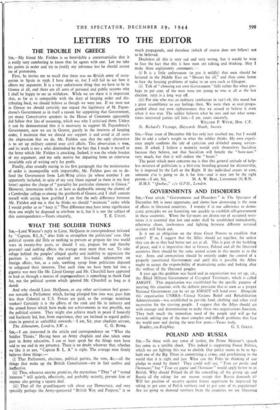Snt,—I am interested in the article and correspondence on "What
the Soldier Thinks." Having been an Army chaplain and also .taken some part in Army education, I can at least speak for the things men have said to me and in my presence. There is no doubt whatever that, whether we like it or not, "Captain B. L. A." is right. The average man firmly believes three things :—
(i) That Parliament, elections, political parties, the vote, &c.—all the things that make up the British Constitution—are in fact useless and ineffective.
(ii) That, whatever anyone promises, the mysterious " They " of "vested interests" will quietly, effectively, and probably secretlt prevent him or anyone else getting a square deal.
(iii) That all the grandiloquent talk about our Democracy, and very specially perhaps the Army-sponsored "British Way and Purpose," is so much propaganda, and therefore (which of course does not follow) not to be believed.
Doubtless all this is very sad and very wrong, but it would be wise to face the fact that this is how men are talking, and thinking. May I make three explanatory comments:— (i) It is a little unfortunate (to put it mildly) that men should be lectured in the Middle East on "Houses for all," and then come home to face the housing problems of today in an area such as Glasgow.
(ii) Talk of "choosing our own Government" falls' rather flat when per- haps 50 per cent, of rhe men were too young to vote at all at the last election. 1935 is a long way off.
(iii) For one who was an ordinary combatant in 1917-18, this mood has a great resemblance to our feelings then. We were then so over-propa- ganded about our own righteousness that we ceased to believe it even when it was true. The soldier believes what he sees and not what some- times interested parties tell him.—I am, yours sincerely, WILLIAM P. WYLIE, Hon. C.F.
St. Richard's Vicarage, Haywards Heath, Sussex.


























 Previous page
Previous page